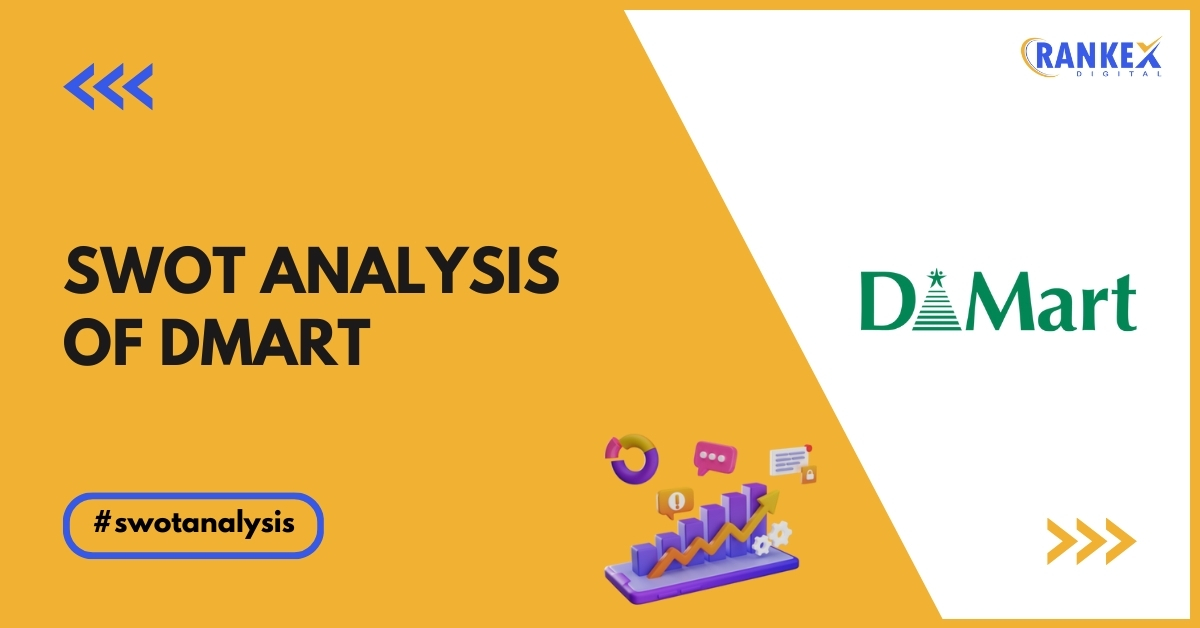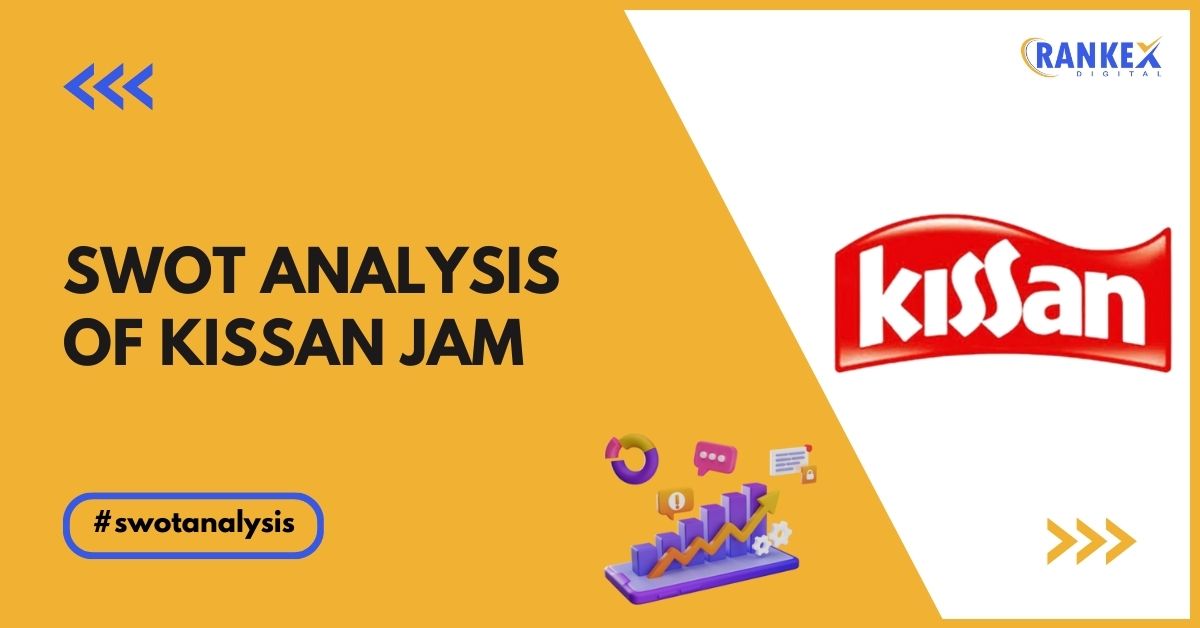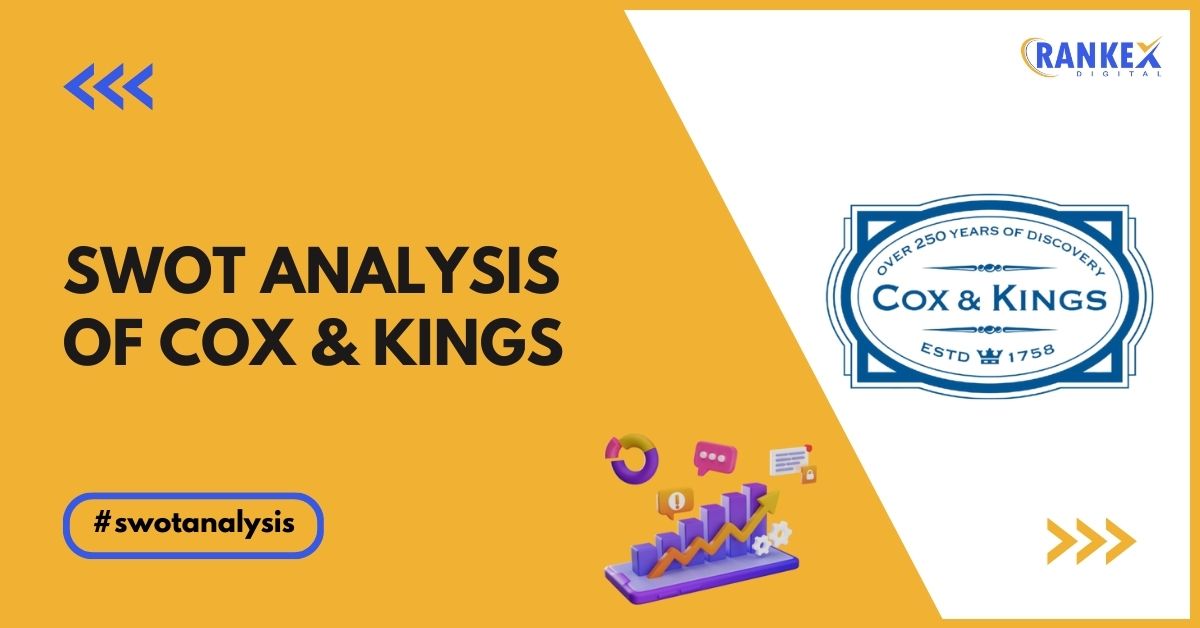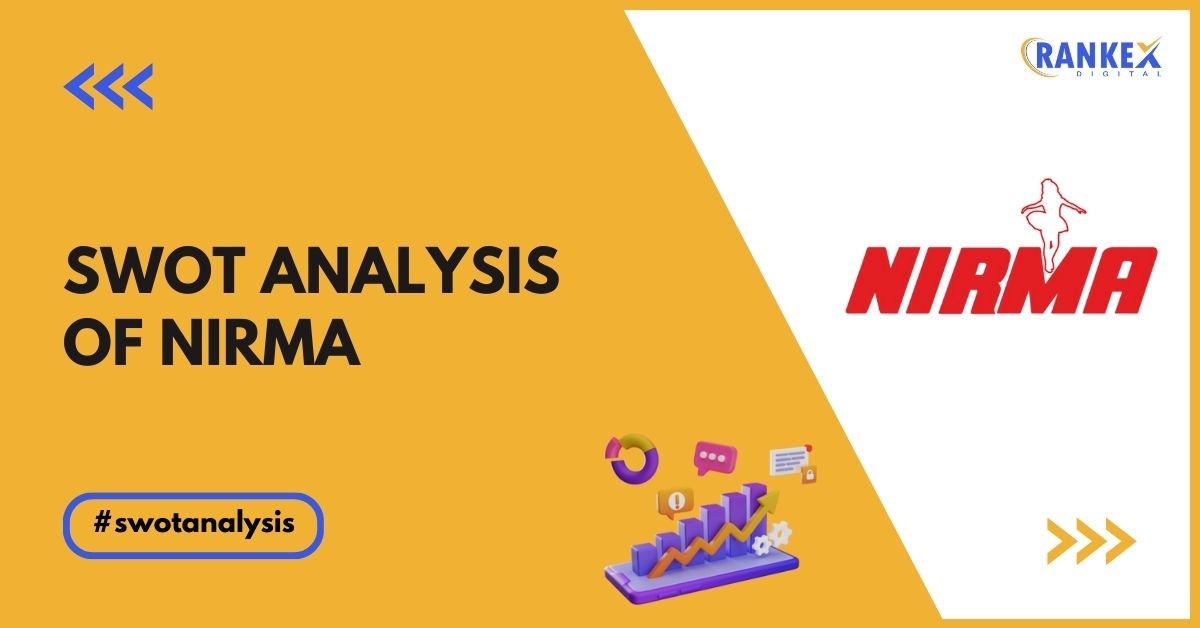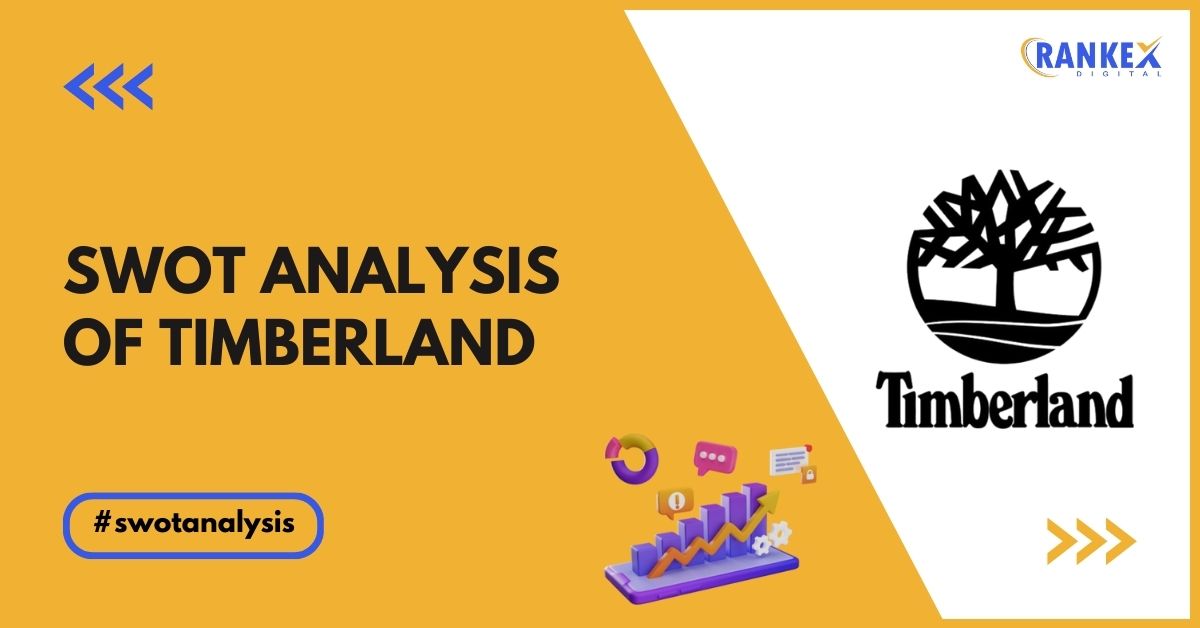DMart, owned and operated by Avenue Supermarts, is one of India’s leading supermarket chains.
Known for its wide range of products and competitive pricing strategy, DMart has become a favourite among Indian consumers.
Despite facing challenges from e-commerce platforms and other retail giants, DMart continues to grow by focusing on its core strengths.
This SWOT analysis of DMart evaluates the company’s current position and future potential in the rapidly evolving retail industry.
Table of Contents
Overview of DMart
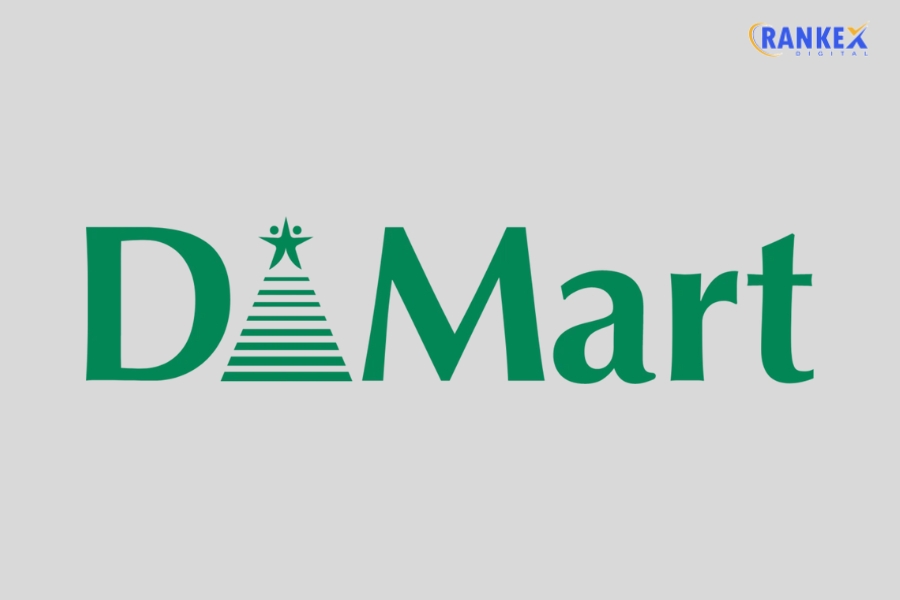
| Founder | Radhakishan Damani |
|---|---|
| Year Founded | 2002 |
| Origin | Mumbai, India |
| Industry | Retail |
| Annual Revenue | ₹43,300 crore (FY 2023) |
| No. of Locations | 330+ (Across India) |
| Key Markets | India |
Current News on the Market on DMart
- Expansion of Store Footprint: DMart has recently focused on expanding its brick-and-mortar stores in Tier II and Tier III cities across India. This aligns with the company’s strategy of catering to growing demand in underserved regions.
- Investment in Technology: DMart is investing in improving its digital infrastructure to compete with e-commerce platforms. The company is strengthening its DMart Ready service, which enables customers to order groceries online and pick them up from designated stores.
- Competition from E-commerce Giants: With the rise of e-commerce giants like Amazon and Flipkart, DMart is facing stiff competition in the online grocery market. However, the company remains resilient due to its well-established physical stores and customer loyalty.
SWOT Analysis of DMart
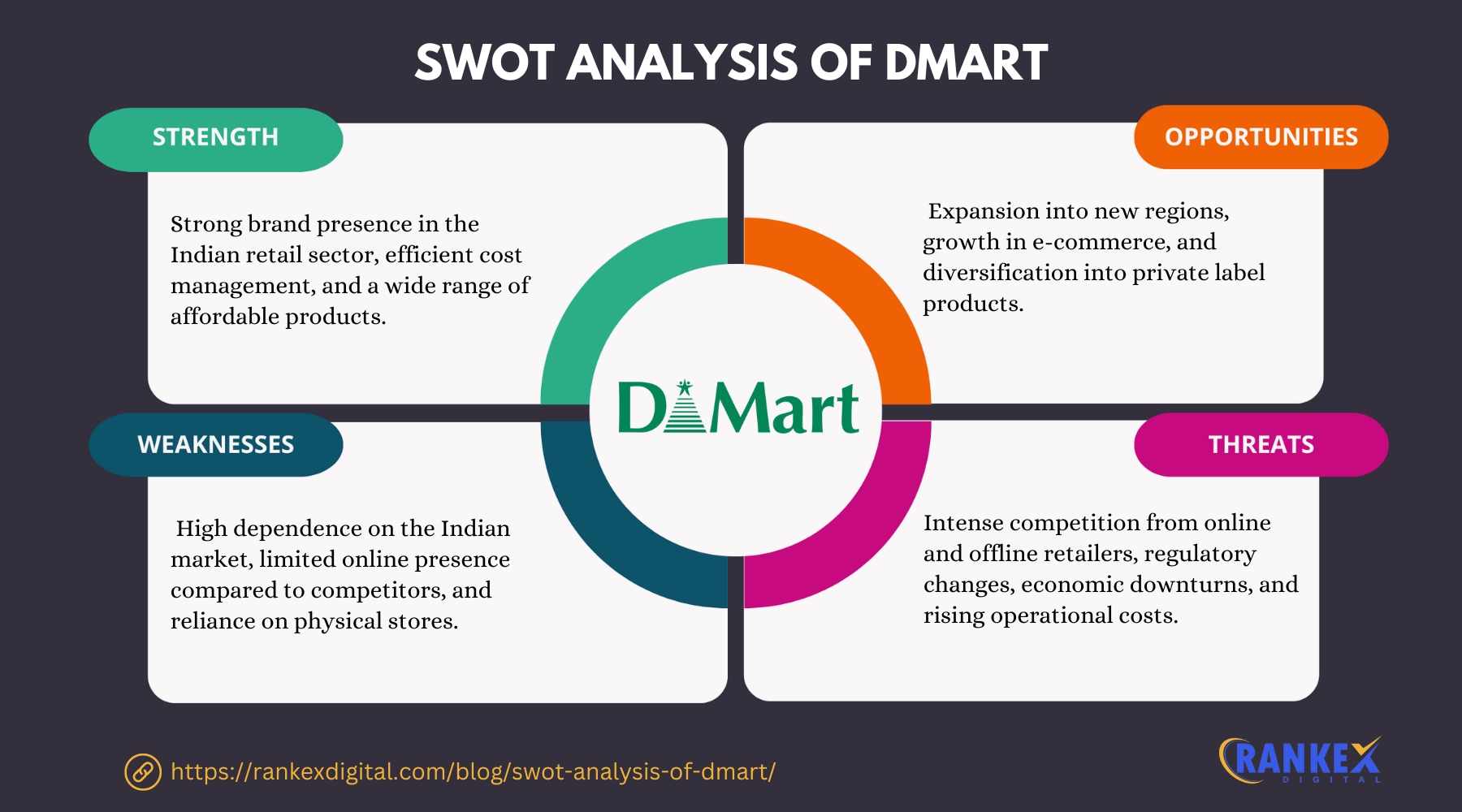
Strengths of DMart
- Low-Cost Leadership
DMart’s ability to offer products at highly competitive prices is one of its key strengths. By negotiating directly with manufacturers and reducing middlemen costs, the company passes on savings to consumers. This cost advantage attracts price-sensitive customers and ensures high footfall. - Wide Range of Products
DMart offers a comprehensive range of products, including groceries, personal care items, household essentials, and apparel. Its variety allows customers to meet all their shopping needs under one roof, making it a convenient one-stop shop. - Strong Financial Position
DMart operates with a debt-light model, focusing on self-funded expansion. The company’s robust financial health allows it to reinvest profits into expanding its store footprint and improving infrastructure without relying heavily on external financing. - Efficient Inventory Management
DMart is known for its efficient supply chain and inventory management system. By maintaining low inventory levels and ensuring quick turnover, the company keeps its costs under control and minimizes wastage. - Loyal Customer Base
DMart enjoys strong brand loyalty, especially among middle-class consumers who appreciate its value-for-money offerings. The company’s consistent focus on affordability and product quality has built a solid reputation in the Indian retail market.
Weaknesses of DMart
- Limited Online Presence
While DMart has introduced DMart Ready, its online presence remains limited compared to e-commerce giants like Amazon and Flipkart. The company has been slow in adapting to the rapid shift toward online shopping, which could hinder its growth in the long run. - Dependence on Physical Stores
DMart’s business model is heavily reliant on its physical stores. This makes it vulnerable to disruptions like the COVID-19 pandemic, which temporarily shut down retail outlets and negatively impacted sales. The company needs to further integrate its offline and online channels to mitigate such risks. - Lack of International Presence
DMart operates exclusively in India, and its lack of international expansion limits its growth opportunities. While focusing on the Indian market has allowed the company to build a strong foundation, expanding globally could unlock new revenue streams. - Geographical Concentration
Most of DMart’s stores are concentrated in Western and Southern India. This geographic concentration limits its reach in Northern and Eastern India, where the company is slowly expanding. It needs to accelerate growth in these regions to tap into a wider customer base. - Low Margin in Product Categories
DMart’s low-margin business model, especially in FMCG products, limits its profitability. While high sales volumes compensate for low margins, any disruption in customer demand or competitive pricing could affect profitability.
Opportunities for DMart
- Expansion into Tier II and Tier III Cities
DMart’s ongoing expansion into Tier II and Tier III cities presents a significant growth opportunity. These regions are witnessing rising disposable incomes and demand for organized retail. By catering to these underserved markets, DMart can significantly increase its market share. - Growth in Online Grocery Market
The online grocery segment in India is expected to grow significantly in the coming years. By strengthening DMart Ready and focusing on enhancing its digital infrastructure, DMart can capitalize on the rising demand for online shopping and expand its customer base. - Private Label Products
DMart can increase its focus on private-label products to enhance profitability. By offering in-house brands in categories like groceries, home essentials, and apparel, the company can achieve higher margins while providing value to consumers. - Sustainability Initiatives
There is an increasing consumer preference for environmentally-friendly products and sustainable retail practices. DMart can capitalize on this trend by adopting eco-friendly packaging, reducing plastic usage, and sourcing sustainable products. - Partnerships and Collaborations
DMart can explore partnerships with local producers, startups, and technology firms to enhance its product offerings and customer experience. Collaborations with fintech companies could also help DMart expand its payment options and loyalty programs.
Threats to DMart
- Intense Competition from E-commerce Platforms
The rapid rise of e-commerce platforms like Amazon, Flipkart, and BigBasket poses a major threat to DMart’s market share. These platforms offer convenience, a wider range of products, and fast home delivery, which could lure customers away from traditional brick-and-mortar stores. - Economic Slowdowns and Inflation
Economic downturns and inflation can negatively affect consumer spending, particularly in the retail sector. DMart’s focus on low-cost products may help it weather economic challenges, but prolonged slowdowns could impact sales and profitability. - Supply Chain Disruptions
DMart relies on an efficient supply chain to keep costs low and inventory moving. Any disruption in the supply chain, whether due to natural disasters, pandemics, or global crises, could affect product availability and sales. - Regulatory Challenges
The retail industry is subject to various regulations, including taxation, labor laws, and environmental standards. Changes in government policies, particularly regarding retail trade and e-commerce, could pose operational challenges for DMart. - Changing Consumer Preferences
As consumer preferences shift toward online shopping, personalized experiences, and sustainable products, DMart may face challenges if it fails to adapt quickly to these changing demands. The company will need to innovate and enhance its customer engagement strategies to stay relevant.
Competitors of DMart
- Reliance Retail
A major player in India’s retail market, Reliance Retail operates a wide range of stores across multiple formats, including grocery, fashion, and electronics. Its aggressive expansion and entry into the online grocery market pose a significant threat to DMart. - Big Bazaar
Part of the Future Group, Big Bazaar is another strong competitor offering a variety of products at competitive prices. Though the company has faced financial challenges, it remains a key player in the Indian retail market. - Amazon India
With its massive online presence and competitive pricing, Amazon is a major competitor for DMart. The e-commerce giant offers a wide range of products and home delivery services, attracting customers who prioritize convenience. - Flipkart
Flipkart is a leading e-commerce platform in India, offering a range of products, including groceries. Its expanding reach in the grocery segment makes it a formidable competitor for DMart in the online space. - BigBasket
BigBasket, India’s leading online grocery platform, offers a wide range of groceries and household products with home delivery services. Its growing popularity, particularly in urban areas, poses a challenge to DMart’s physical store model.
Conclusion
DMart continues to be a dominant player in the Indian retail sector, with its cost leadership and efficient inventory management driving its success.
However, the company faces increasing competition from e-commerce giants and must adapt to the growing trend of online shopping.
By leveraging opportunities in Tier II and Tier III cities, enhancing its online presence, and focusing on sustainability, DMart can continue to thrive and beyond.
Addressing its weaknesses and adapting to market changes will be key to maintaining its competitive edge.
Frequently Asked Questions
1. What are DMart’s strengths?
DMart’s key strengths include its low-cost leadership, wide product range, strong financial position, efficient inventory management, and loyal customer base.
2. What challenges does DMart face?
DMart faces challenges such as limited online presence, dependence on physical stores, lack of international expansion, and low margins in its product categories.
3. What opportunities are available for DMart?
Opportunities include expansion into Tier II and Tier III cities, growth in the online grocery market, increasing focus on private-label products, sustainability initiatives, and partnerships with other companies.
4. Who are DMart’s main competitors?
DMart’s main competitors are Reliance Retail, Big Bazaar, Amazon India, Flipkart, and BigBasket.

